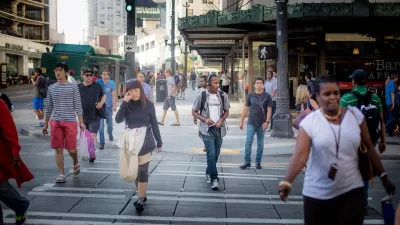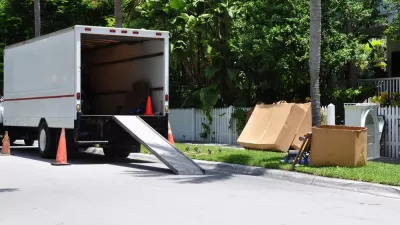New census data shows that millennials and seniors are migrating less, a result of the Great Recession and its economic impacts. For those who are moving, cities in the Sun Belt have been primary destinations.

Demographer William H. Frey writes about the migration trends of millennials and Baby Boomers after the Great Recession, evident in new American Community Survey data. Migration rates for both groups slowed during and after the recession, reflecting the job and housing challenges millennials have faced and the delayed retirement and relocation limitations of seniors, says Frey.
Migration magnets for millennials are largely Sun Belt cities in the South and West. Baby Boomers also have headed to the Sun Belt, but none of the top five cities for each group overlapped, notes Frey. While both groups are leaving high-cost metropolitan areas, particularly on the coasts, millennials are spreading out across the country while seniors are focusing on the more traditional retirement states of Arizona and Florida.
"Millennials are more mobile than their elders and more apt to shift with changing opportunities, particularly to areas with knowledge based economies. In contrast, those seniors who do move are zeroing in on a smaller set of exclusively Sun Belt destinations that have long been associated with retirees, warm climates and recreation," concludes Frey.
FULL STORY: How migration of millennials and seniors has shifted since the Great Recession

Alabama: Trump Terminates Settlements for Black Communities Harmed By Raw Sewage
Trump deemed the landmark civil rights agreement “illegal DEI and environmental justice policy.”

Study: Maui’s Plan to Convert Vacation Rentals to Long-Term Housing Could Cause Nearly $1 Billion Economic Loss
The plan would reduce visitor accommodation by 25% resulting in 1,900 jobs lost.

Planetizen Federal Action Tracker
A weekly monitor of how Trump’s orders and actions are impacting planners and planning in America.

Grand Rapids Mayor Proposes Garage Conversion Plan
The mayor says allowing homeowners to convert garages to dwelling units could alleviate the city’s housing shortage.

Baltimore Ordered to Improve Sidewalk Accessibility
The city is one of many to face lawsuits for failing to comply with the Americans with Disabilities Act.

This Toronto Suburb Has More Bus Riders Than Columbus, Ohio
Brampton, Ontario used gradual improvements in service to prove that if you build it, they will ride.
Urban Design for Planners 1: Software Tools
This six-course series explores essential urban design concepts using open source software and equips planners with the tools they need to participate fully in the urban design process.
Planning for Universal Design
Learn the tools for implementing Universal Design in planning regulations.
Smith Gee Studio
Alamo Area Metropolitan Planning Organization
City of Santa Clarita
Institute for Housing and Urban Development Studies (IHS)
City of Grandview
Harvard GSD Executive Education
Toledo-Lucas County Plan Commissions
Salt Lake City
NYU Wagner Graduate School of Public Service




























